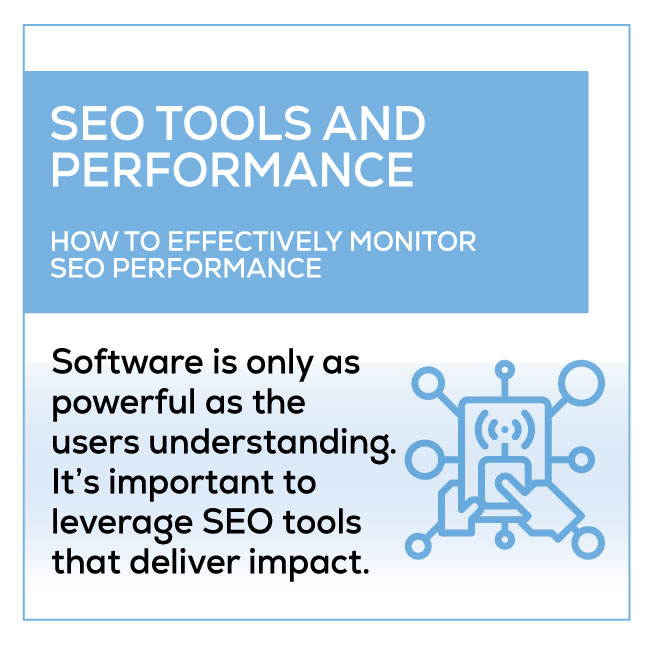SEO Tools and Performance Reporting
There are many different SEO tools available today that can help businesses improve their website’s search engine rankings and visibility. Here are some of the most popular types of SEO tools:
- Keyword Research Tools: These tools help businesses identify relevant keywords and phrases to target in their content. Examples of keyword research tools include Google Keyword Planner, SEMrush, Ahrefs, Conductor and Moz Keyword Explorer.
- On-Page Optimization Tools: These tools help businesses optimize their website’s on-page elements, such as title tags, meta descriptions, and headings. Examples of on-page optimization tools include Yoast SEO, SEOptimer, and Screaming Frog.
- Backlink Analysis Tools: These tools help businesses analyze their website’s backlink profile and identify opportunities to improve their link building strategy. Examples of backlink analysis tools include Ahrefs, Majestic, and Moz Link Explorer.
- Technical SEO Tools: These tools help businesses identify and fix technical issues on their website, such as broken links or duplicate content. Examples of technical SEO tools include Google Search Console, SEMrush Site Audit, ContentKing and Screaming Frog.
- Rank Tracking Tools: These tools help businesses monitor their website’s search engine rankings and track their progress over time. Examples of rank tracking tools include Google Search Console, SEMrush, Conductor, Ahrefs, and Moz.
- Content Analysis Tools: These tools help businesses analyze their content for readability, keyword density, and other factors that can impact search engine rankings. Examples of content analysis tools include Yoast SEO, SEMrush Writing Assistant, ContentKing and Hemingway Editor.
- Local SEO Tools: These tools help businesses optimize their website and online listings for local search results. Examples of local SEO tools include Google My Business, Moz Local, and BrightLocal.
These are just a few examples of the many SEO tools available today. Depending on your business’s needs and budget, there are many options to choose from that can help you improve your website’s search engine rankings and visibility.
The Success of Any Software is Dependent on the Users and Software Adoption
While SEO tools can be incredibly powerful for improving a website’s search engine rankings and visibility, their effectiveness is limited by software adoption and user skill levels. In other words, simply having access to SEO tools isn’t enough to guarantee success – you also need to know how to use them effectively.
SEO Resources and Budget
Firstly, not all businesses have the resources or budget to invest in SEO tools. While many tools offer free versions or trial periods, the most powerful features are often only available with a paid subscription. This can make it difficult for small businesses or individuals to access the full range of SEO tools available.
SEO Tools: Efficiency of configuration and data interpretation
Even for those who do have access to SEO tools, the effectiveness of these tools depends on the user’s skill level and ability to use them effectively. Many SEO tools are incredibly powerful, but they also require a certain level of technical knowledge and expertise to use effectively.
For example, backlink analysis tools can be incredibly valuable for identifying opportunities to improve a website’s link profile. However, if the user doesn’t understand the basics of link building or how to analyze backlink data effectively, the tool may not be as effective as it could be.
Laser-focused Keyword Identification
Similarly, keyword research tools can be incredibly valuable for identifying relevant keywords and phrases to target in your content. However, if the user doesn’t understand how to use these keywords effectively in their content or how to analyze keyword data to inform their content strategy, the tool may not be as effective as it could be.
While SEO tools can be incredibly powerful for improving a website’s search engine rankings and visibility, their effectiveness is limited by software adoption and user skill levels. Businesses need to invest in the right tools and ensure that they have the technical knowledge and expertise to use them effectively in order to see the best results.
In-House SEO Advantages for Online Brands
Having in-house SEO expertise can be incredibly valuable for online brands, as it allows businesses to have a dedicated team or individual who is focused solely on improving their website’s search engine rankings and visibility.
Familiarity improves SEO efficiency
Firstly, having in-house SEO expertise means that businesses have someone who is intimately familiar with their brand, their target audience, and their industry. This allows the SEO expert to create targeted and effective SEO strategies that are specifically tailored to the business’s unique needs and goals.
On-call for immediate insight and recommendations
Additionally, having in-house SEO expertise means that businesses have someone who is available to address SEO issues and opportunities as they arise. Rather than having to wait for an external agency or consultant to make changes to their website or content, businesses can make updates quickly and efficiently in-house.
Benefits of in-house SEO
The benefit of having in-house SEO expertise means that businesses can ensure that their SEO strategies are aligned with their broader business goals and objectives. This allows for better collaboration between the SEO team and other departments, such as marketing, sales, and product development, and can help to ensure that SEO efforts are integrated into the broader business strategy.
Lower SEO cost vs Outside Agencies
In-house SEO expertise can be more cost-effective in the long run, as businesses can avoid the costs associated with outsourcing SEO work to external agencies or consultants. While hiring an in-house SEO expert may require an initial investment, it can ultimately save businesses money over time and lead to better results.
Having in-house SEO expertise can be incredibly valuable for online brands. It allows businesses to create targeted and effective SEO strategies, make updates quickly and efficiently, ensure alignment with broader business goals, and potentially save money in the long run.

